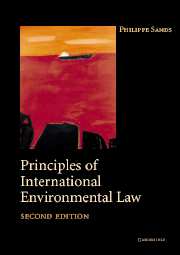Book contents
- Frontmatter
- Contents
- Foreword
- Preface and acknowledgments to the first edition
- Preface and acknowledgments to the second edition
- Table of cases
- Table of treaties and other international instruments
- List of abbreviations
- PART I The legal and institutional framework
- PART II Principles and rules establishing standards
- 6 General principles and rules
- 7 Human rights and armed conflict
- 8 Atmosphere
- 9 Oceans and seas
- 10 Freshwater resources
- 11 Biological diversity
- 12 Hazardous substances and activities
- 13 Waste
- 14 The polar regions: Antarctica and the Arctic
- 15 European Community environmental law
- PART III Techniques for implementing international principles and rules
- Index
11 - Biological diversity
- Frontmatter
- Contents
- Foreword
- Preface and acknowledgments to the first edition
- Preface and acknowledgments to the second edition
- Table of cases
- Table of treaties and other international instruments
- List of abbreviations
- PART I The legal and institutional framework
- PART II Principles and rules establishing standards
- 6 General principles and rules
- 7 Human rights and armed conflict
- 8 Atmosphere
- 9 Oceans and seas
- 10 Freshwater resources
- 11 Biological diversity
- 12 Hazardous substances and activities
- 13 Waste
- 14 The polar regions: Antarctica and the Arctic
- 15 European Community environmental law
- PART III Techniques for implementing international principles and rules
- Index
Summary
Introduction
The role of law in the conservation of biological diversity (biodiversity), which includes flora and fauna and the variety among living organisms and the ecological communities they inhabit, dates back to the creation of the Yosemite National Park in California as the world's first protected area. Since then, legal rules have been adopted at the local, national, bilateral, regional and, relatively recently, the global levels to halt what is now considered by some members of the scientific community to be a crisis that leaves biodiversity more threatened than at any time in the past sixty-five million years.
Biodiversity can be considered in relation to three hierarchical categories which describe different aspects of living systems measured in different ways: genetic diversity (the variation of genes within a species); species diversity (the variety of species within a region); and ecosystem diversity (the variety of ecosystems within a region). Other expressions of biodiversity include the relative abundance of species, the age structure of populations, the pattern of communities in a region, and changes in community composition and structure over time.
Threats to biodiversity come from several sources. Tropical deforestation is readily cited as the main issue, but serious threats are also posed by the destruction of temperate forests, wetland and coral reefs. Human activity contributes to the destruction of nature and the loss of biodiversity through direct activities (hunting, collection and persecution) and indirect activities (habitat destruction and modification from industrial, agricultural and other activities).
- Type
- Chapter
- Information
- Principles of International Environmental Law , pp. 499 - 617Publisher: Cambridge University PressPrint publication year: 2003



